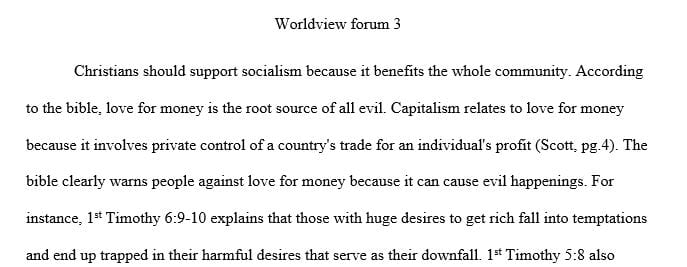Does Capitalism follow Scripture? Why or why not
WORLDVIEW FORUM 3 (Write at least 250 words)
There is a lot of disagreement among those who call themselves Christians as to whether Christians should espouse Socialism or Capitalism. Does Capitalism follow Scripture? Why or why not? Back up what you say with specific Scripture. Read Acts 5:3-4 and talk about how it fits with either system. How does each fail when it comes to practical things, like technology, and relationships with others? Can you squeeze art into the conversation? Use Scriptural principles and specific passages to illustrate.
Be sure to read Acts 5:1-10 very carefully before posting to this thread. It holds keys to the Biblical attitude for personal property. It’s true Acts 4:34-35 is often used to suggest they had no personal property, pooling all their money together the way a socialist might, but read the first ten verses of Acts 5 carefully before proceeding.
Do you know of other passages that might be brought into the discussion.
Please also read the following from Adam Clarke in his Commentary on Acts 2:44 –
And had all things common – Perhaps this has not been well understood. At all the public religious feasts in Jerusalem, there was a sort of community of goods. No man at such times hired houses or beds in Jerusalem; all were lent gratis by the owners [see Yoma, fol. 12. Megill. fol. 26]. The same may be well supposed of their ovens, cauldrons, tables, spits, and other utensils. Also, provisions of water were made for them at the public expense [Shekalim, cap. 9. See Lightfoot here]. Therefore a sort of community of goods was no strange thing at Jerusalem, at such times as these. It appears, however, that this community of goods was carried farther; for we are informed, Acts 2:45, that they sold their possessions and their goods, and parted them to all, as every man had need. But, this probably means that, as in consequence of this remarkable outpouring of the Spirit of God; and their conversion, they were detained longer at Jerusalem than they had originally intended, they formed a kind of community for the time being, that none might suffer want on the present occasion; as no doubt the unbelieving Jews, who were mockers, Acts 2:13, would treat these new converts with the most marked disapprobation. That an absolute community of goods never obtained in the Church at Jerusalem, unless for a very short time, is evident from the apostolic precept, 1 Corinthians 16:1, etc., by which collections were ordered to be made for the poor; but, if there had been a community of goods in the Church, there could have been no ground for such recommendations as these, as there could have been no such distinction as rich and poor, if every one, on entering the Church, gave up all his goods to a common stock. Besides, while this sort of community lasted at Jerusalem, it does not appear to have been imperious upon any; persons might or might not thus dispose of their goods, as we learn front the case of Ananias, Acts 5:4. Nor does it appear that what was done at Jerusalem at this time obtained in any other branch of the Christian Church; and in this, and in the fifth chapter, where it is mentioned, it is neither praised nor blamed. We may therefore safely infer, it was something that was done at this time, on this occasion, through some local necessity, which the circumstances of the infant Church at Jerusalem might render expedient for that place and on that occasion only.
Answer preview to does Capitalism follow Scripture? Why or why not
APA
348 words



